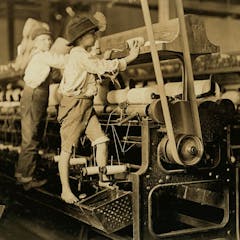
Articles on US history
Displaying 141 - 160 of 438 articles

US ideas about conservation center on walling off land from use. That approach often means expelling Indigenous and other poor people who may be its most effective caretakers.

More than a fifth of US children were working in 1900, and many Americans saw nothing wrong with that. It took decades of activism and court battles plus economic upheaval to change course.

The Trump administration is opening the Arctic National Wildlife Refuge to oil and gas leasing – a step that’s as much about politics as it is about energy.

No one involved in local government wants to see federal law enforcement agents take over their policing. But a mayor who’s also a legal scholar says there’s history and precedent for it.

A 21st-century hockey team is connected with Gen. Sherman’s Atlanta campaign and the destructive journey to Savannah.

Flying the distinctive Confederate flag stokes strong reactions — as Australian soldiers are discovering.

For some viewers, President Trump’s July 3 speech at Mount Rushmore represented love of country. Others saw it very differently.

It may have a diverse cast but it erases the Black and Indigenous people who were there in the room and relegates women to the sidelines.

Hamilton – soon to stream as a film – has been hailed as radical. But it’s true to the traditions of the American musical – the pursuit of truth, freedom and the American dream.

A century ago, the influenza pandemic killed about 50 million people. Today we are battling the coronavirus pandemic. Are we any better off? Two social scientists share five reasons we have to be optimistic.

In the 1800s, Americans hunted many wild species near or into extinction. Then in the early 1900s, the US shifted from uncontrolled consumption of wildlife to conservation. Could Asia follow suit?

School systems realized that they couldn’t deal with the pandemic on their own.

The agency’s earliest ad campaigns emphasized youthful idealism, patriotism and travel opportunities. That was an easier sell than urging Americans to enlist in an anti-communist operation.

On the 100th anniversary of the 19th Amendment, women’s historic struggles to vote continue to resonate as the country debates who should vote and how.

A biographer of George Washington says that the father of the country would have no problem wearing the kind of protective gear that President Trump shuns.

Small-scale gold mining operations in developing countries are major sources of toxic mercury pollution, using techniques that haven’t changed much since the California Gold Rush 150 years ago.

Franklin Delano Roosevelt’s personal battle with polio, and his steady hand while overseeing a national eradication campaign, highlights decisive leadership against a virus that terrified America.

During a tour to Australia, Little Richard feared the nuclear apocalypse and – on stage – annonced he was giving up music.

Little Richard swung between flamboyant performances and religious fervour - but he always came back to music. With news of his death at 87, musicians paid tribute to his huge rock ‘n’ roll legacy.

COVID-19 outbreaks have occurred at more than 100 US meatpacking plants. Geography, workforce demographics and economic concentration make it hard for workers to fight for better conditions.
